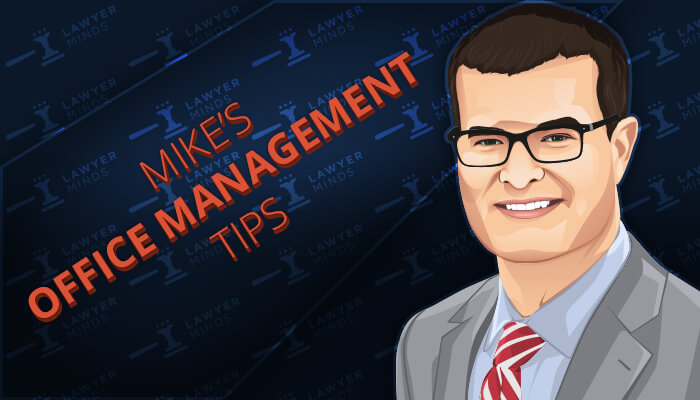Popular Law Firm Security Management Methods

To run a successful law firm– whether it’s a solo practice or a large firm– you’ll need to not only excel in the areas of law you’re practicing in but also in all matters of running the practice itself. Running a legal practice comes with its own unique set of challenges that even the most prepared lawyer setting out to start a new practice may find themselves overwhelmed with. I’m here to help make the job of running your law office just a little easier. Welcome back to Mike’s Office Management Tips.
— Mike Campbell
For any law firm, security should be a top priority. Clients entrust their attorneys to keep all sensitive data confidential and secure. Whether you currently focus on security management methods at your firm or you’re looking to improve how your firm handles security, it’s important to understand the risks you’re up against, what your obligations are, and what some of today’s best practices are that you can implement.
Data Security Risks for Law Firms
With the information that law firms store, it’s no surprise they are a common target for hackers and criminals. You could be in possession of valuable information like personally identifiable information, intellectual property, or confidential attorney-client-privileged data.
Some of the most common risks law firms face in regard to data include phishing emails and phished email accounts, ransomware, public leaks of personal information, and detrimental viruses. If data is breached from your firm, you could be looking at negative reputational effects, as well as potential malpractice allegations and lawsuits.
Ethical and Regulatory Obligations
Per ABA Rule 6.1 Confidentiality of Information, attorneys are responsible for making “reasonable efforts to prevent the inadvertent or unauthorized disclosure of, or unauthorized access to, information relating to the representation of a client.” To comply with that professional and ethical obligation, you have to take measures to protect your law firm’s data. If you fail to do so, the consequences could be disastrous for your client, their case, and the future of your firm.
Best Practices for Protecting Your Law Firm’s Data
While there is no way to completely secure your law firm’s data, as hackers are learning new ways around security management methods every day, there are practices you can implement that will make it exceedingly difficult for any of your data and your clients’ data to get exposed. Consider the following:
- Implement a data security policy. If you don’t already have one, implement a data security policy at your law firm. Ensure everyone who works at your firm is aware of the plan and has access to the information they need to keep the plan intact.
- Train staff to recognize security risks. Not everyone knows how to spot a phishing scam, and if you’re sorting through hundreds of emails a day, it’s possible you could miss one. Make sure employees know how to avoid user errors that could increase the risk of a data breach.
- Use strong passwords. If your passwords are simple, guessable, or old, it’s time to make some changes. Simple passwords make you an easy target for hackers. To create a better password, make sure it’s long and complex. If you can’t easily remember it, it’s unlikely someone will be able to guess it. It’s also a good idea to use a password management tool, so you don’t have to write them down or memorize anything.
- Ensure sensitive documents and files are encrypted. If you don’t already, make sure you encrypt all sensitive data. Encryption translates your data into a secret code and requires a key or password to access it. If only your firm and your client have the password to their information, you won’t have to worry about someone else getting access.
- Have a disaster recovery plan. Even when you implement the best practices for data management, it’s still important to plan for a potential disaster. Create a plan for what happens in the event of a data breach and test the plan. It would help if you also had a disaster recovery plan in place in the event a software or hardware failure leads to missing files.
No matter what type of law you practice, your clients deserve to know their information is safe with you. If information were to ever get into the wrong hands because of your poor practices, you could be looking at legal issues and damage to your firm’s reputation. Make sure that you are regularly reviewing your firm’s security management methods, staying on top of risk factors, and making changes as needed.


